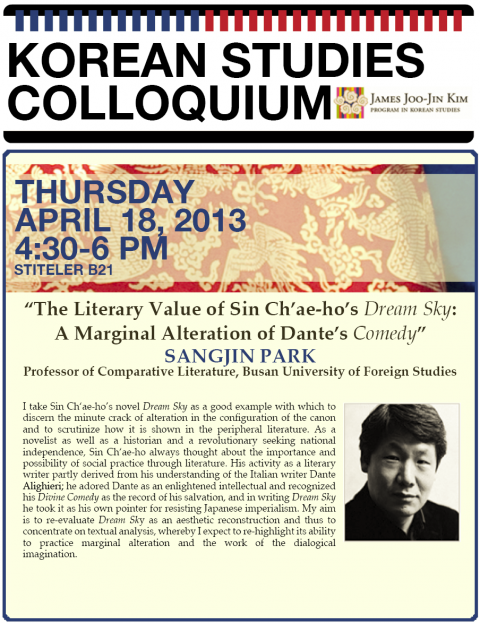
Korean Studies Colloquium
Stiteler Hall, Room B21
Sangjin Park, Professor of Comparative Literature, Busan University of Foreign Studies
The issue of canonicity has been widely discussed, particularly since the spread of cultural influence from the European great powers to the peripheral areas. In the past, the classical canons suppressed differences in locality, gender and generation. What matters now is to recognize the changeability, rather than the constancy, of canonicity which this paper intends to observe in the historical and cultural processes of the marginal alteration of a Western canon in modern Korea. Indeed, we need to imagine how a canon exists; it is premised on the dichotomy of center and periphery, yet with its blurring relationship, it repeatedly both negates and maintains itself so as to be highlighted through its literary value.
This paper takes Sin Ch‘ae-ho’s novel Dream Sky as a good example with which to discern the minute crack of alteration in the configuration of the canon and to scrutinize how it is shown in the peripheral literature. As a novelist as well as a historian and a revolutionary seeking national independence, Sin Ch‘ae-ho always thought about the importance and possibility of social practice through literature. His activity as a literary writer partly derived from his understanding of the Italian writer Dante Alighieri; he adored Dante as an enlightened intellectual and recognized his Divine Comedy as the record of his salvation, and in writing Dream Sky he took it as his own pointer for resisting Japanese imperialism.
This paper aims to re-evaluate Dream Sky as an aesthetic reconstruction and thus to concentrate on textual analysis, whereby I expect to re-highlight its ability to practice marginal alteration and the work of the dialogical imagination.
 James Joo-Jin Kim Center for Korean Studies
James Joo-Jin Kim Center for Korean Studies